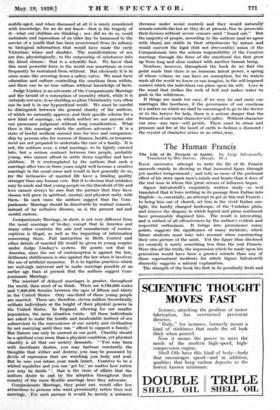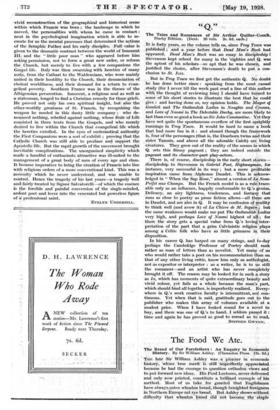The Human Francis
EACH successive attempt to write the life of St. Francis succeeds mainly in shoWing us that immortal figure through yet another temperament ; and tells us more of the profound effect of his story upon men's minds and hearts than it does of the real man in whom this great stream of influence began. '
Signor Salvatorelli's exquisitely written study—so well translated that it loses nothing in its passage from Italian into English-is, essentially, an attempt to get at this real Praneis : to bring hint out of church, set him in the vivid Italian sun- light, the hardly changed landscape, of the Umbrian plain, and remove the drapery in which legend and pious sentiment have presumably disguised him. The 'result is interesting, and is robbed of all offensiveness by the author's evident and respectful enthusiasm. It brings into prominence many points, suggests the significance of many incidents," which future students must take into account when constructing their own picture of the saint. Yet the figure thus disclosed (or created) is surely something less than the real Francis. Were this all the truth, the impression which he made upon his generation would have been a greater miracle than any of those supernatural incidents for which Signor Salvatorelli discreetly suggests a natural explanation.
The strength of the book lies first in its peculiarly fresh and
vivid reconstruction of the geographical and historical scene within which Francis was born ; the landscape in which he moved, the personalities with whom he came in contact : next in the psychological imagination which is able to re- create for us the mental processes that determined the actions of the Seraphic: _Father..iinft hiss-ealiy -ctiacipies; Jun; Value is given to the dramatic contrast between-the world of Innocent HE- and the " little poor man " who appeared before him asking permission, not to form a great new order,_ or reform -the Chtirch, but merely to live with a few companions the GoSpel life. Italy was then swarming with heretics of many sorts, from the Cathari to the Waldensians, who were mainly united in their hostility to the Church, their denunciation of clerical worldliness, and their demand for a return to 'evan- lelical- poverty. Southern France was in the threes -of the Albigensian persecution. Innocent, a religious soul. as well as a statesman, -longed to finda Christian remedy for -these griefs. He:proved not only his own spiritual insight, but- alSo the other-worldly greatness of St. Francis; by recognizing the weapon he needed in this dusty little company ; Who de- nounced nothing, rebelled against nothing, whose Rule of Life consisted in three texts from the Gospels, and who merely desired to live within the Church that evangelical- life which the heretics extolled. In the eyes of ecclesiastical authority the First Companions were a sort of exhibit ; proving that the Catholic Church was still able to produce and - support the ApOstolic life: But the rapid growth of the movement brought inevitable complications. The unorganized simplicity which -mac a handful of enthusiasts attractive was ill-suited to the management of a great body of men of every age and class. It became imperative to bring the -Creation of Francis into line with religious orders of a more conventional kind. This was a necessity which he never understood, and was unable to control. Hence the tragedy of. his list yearsL7a tragedy well anaifilirly treated by Signor Salviitorelli—of which the essence is the forcible and painful conversion of the single-minded, ardent poet and lover into the venerated but powerless figure of " professional saint.
EVELYN UNDERHILL.



































 Previous page
Previous page